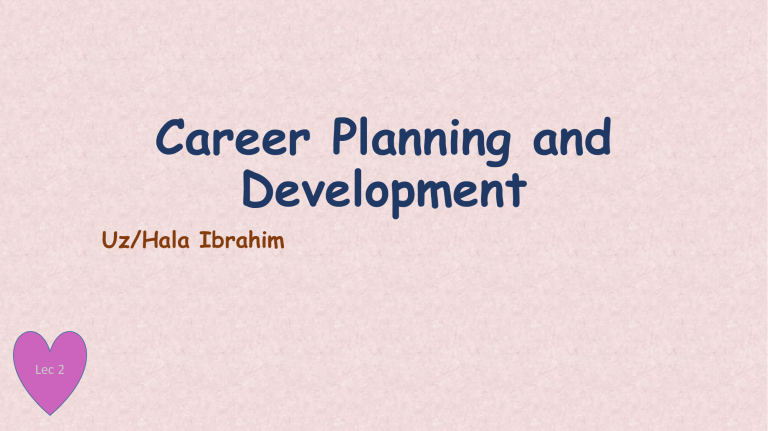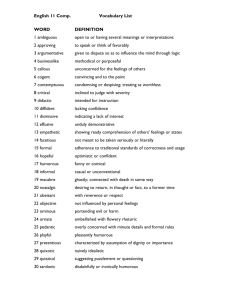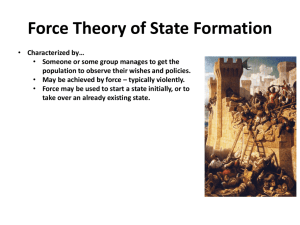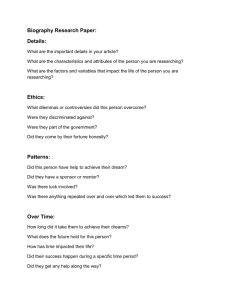
Career Planning and Development Uz/Hala Ibrahim Lec 2 • The six stages of modern career development are: Assessment Investigation Preparation Commitment Retention Transition Assessment Stage of Career Development • In the Assessment Stage, you are getting ready for your life’s work. This stage is characterized by unawareness, in that you are not sure what your values, strengths, and weaknesses are. You start to feel as though you want to know more about yourself and make a conscious effort to get in touch with who you really are. Taking assessment instruments Working with a career counselor or career coach In this stage, you are just getting ready to find what’s out there for you. You are still unaware of what opportunities are out there, and you don’t know what your strengths, weaknesses and values are. You are also curious to know about yourself particularly what you can do. Investigation Stage of Career Development • In the Investigation Stage, you are researching what work exists in the world. This stage is characterized by feelings of confusion, in that you are not sure what career options exist for you. You may feel overwhelmed with all of the jobs and opportunities that exist as you begin the process of researching the modern world of work. But if you approach this stage with a positive frame of mind, you will find that you will learn about many possibilities you may have never considered. Researching the world of work Conducting informational interviews with people in your chosen Preparation Stage of Career Development • In the Preparation Stage, you are still getting ready to do your life’s work. This stage is characterized by feelings of excitement, as you think of how wonderful it will be to perform meaningful work. However, there is still much work to be done, and to be successful, you have to prepare. Gaining knowledge and experience Setting goals and adopting a success-oriented mind-set In this stage, you are making all the necessary preparations to finally join the workforce. You are excited about the possibilities, and you are thrilled to finally do something meaningful. However, you know there is still much to be done, so you’re getting yourself ready. Commitment Stage of Career Development • In the Commitment Stage, you will feel confident that you have figured out what you are meant to do. Sometimes people have known all along what they were meant to do but could not commit to the process of making it happen, for whatever reason. At this stage, more than ever, you must focus your energy and keep your eye on the target. Conducting a job search Negotiating and accepting a job offer You now have the confidence that you know what you want to do. Unlike in the past, you not only know what you want, you are also committed to it. There will be a lot of distractions around you, so you have to focus on the task at hand and the target itself. Retention Stage of Career Development • In the Retention Stage, you will feel comfortable in your career field, as you will now have figured out how things work in your industry. You will want to remain committed to your career by continually updating your skill set and staying current with industry standards. Providing first-class customer-service skills Building a professional network In this stage, you feel more confident about your chosen career. You know how things work in such field, and you believe that you can overcome whatever career challenges you may face. You will also be making an effort to update your skills so that you may remain current with the industry standards. Transition Stage of Career Development • The Transition Stage is characterized by feelings of discomfort in that you are unsure of what you will be doing next (and/or if you will be happy). In this stage, you will learn to make conscious changes in your career direction. Making career changes Developing resilience in this stage that you will be feeling some sort of discomfort because you aren’t sure what direction your career is taking. You may even find yourself unhappy with your career, and the thought of switching careers is just appealing to you. This is when you should decide what career direction to take. • Types of Opportunities to pursue in marketing: 1. Market Penetration: Sell more to existing customers. increase market share within existing segments. "Selling more products in existing markets" 2. Market Development : Sell to new customers. could be new customers overseas, or new customers in a new segment. "Selling existing products in new markets (either geographic or new segments) 3. Product Development: Sell to customers by changing the FABs (features, advantages and benefits) of the product. "Selling new products in existing markets" 4. Diversification: Sell a completely new product to a new segment, "Selling a new product in a new market"



